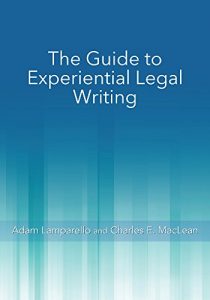This book builds a bridge between legal education and law practice, and sets forth a groundbreaking, comprehensive blueprint that retains the foundational pillars of legal education while integrating doctrine, skills, and clinical instruction into a cohesive, outcome-based, and assessment-driven curriculum that trains students to acquire core lawyering competencies. The book’s cross-curricular model enables students to litigate a fictional case involving issues from all first-year courses.
In a Wisconsin Law Review article, Richard Redding, Vice Chancellor for Graduate Education and Wang-Fradkin Professor of Law, Psychology, and Education at Chapman University, highlighted the Indiana Tech Law School curriculum, which is comprehensively set forth in The Guide to Experiential Legal Writing. See the following excerpt for details.
“Perhaps one of the best models for skills integration throughout the curriculum has been developed by Indiana Tech Law School, which has implemented a curriculum that 'horizontally' (exercises are sequenced in the order they would be performed in law practice: initial client interview, legal research and draft memorandum, draft motion to dismiss or answer, file interrogatories) and 'vertically' (doctrinal issues in the hypothetical case are timed to coincide with relevant topics covered in the doctrinal courses) integrates skills exercises throughout the three years of law school.”












